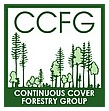The ANW Deutschland e.V. (Pro Silva Germany association, headed by Hans von der Goltz) started at the end of 2015 a project called “BioWild”, dealing with the disequilibrium between natural forest regeneration / forest biodiversity and ungulate populations in Germany. In close cooperation with the universities of Dresden (Prof. Michael Muller), Gottingen (Prof. Christian Ammer) and Munich (Prof. Thomas Knoke) 25,000 hectares of forest lands will be monitored within 5 pilot regions for the upcoming 6 years. Our key objective is to promote biodiverse, mixed, stable and resilient forests. Based on field observations the BioWild-Project memberswill demonstrate to the public, and to the participating forest owners and hunters in particular, which immediate and long term ecologic and economic effects their decisions have on silvicultural issues, biodiversity or hunting. For this purpose the project results will be processed as easily understandable demonstration sites in the pilot regions. Guiding principles for policy and decision support will also be formulated. If you want to get more information about the BioWild-Project, please go to www.biowildprojekt.de.
Posts Tagged ‘project’
Drought damage to Sitka spruce in eastern Britain and disease impacts on pine, and larch more widely, suggest that total reliance on Sitka spruce monocultures for upland forestry may prove unwise. The project re-evaluates mixed-species upland plantations which combine Sitka spruce with alternative productive conifers such as Norway spruce, Douglas fir, western hemlock, grand fir and noble fir, and touches on other potential alternatives.
The outcomes suggest that this approach could offer significant benefits of resilience to novel pests and diseases and, to a lesser extent, climate change. There are also advantages in terms of silvicultural development and ecological sustainability. The full report can be viewed on the Scottish Forestry Trust website.


